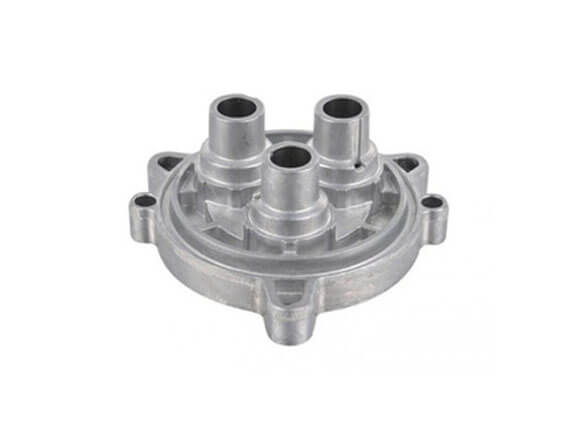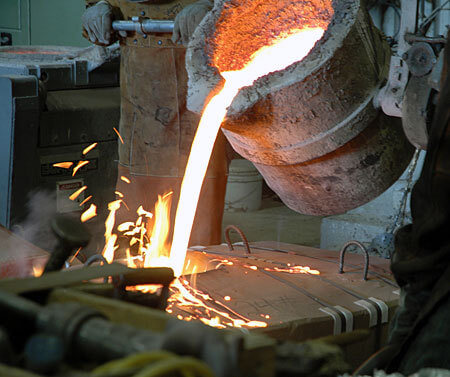The Role of Light Weight Aluminum Foundries in Progressing Lightweight Manufacturing Solutions
Light weight aluminum shops significantly contribute to the development of lightweight production solutions. Their ingenious casting innovations yield high-strength, lightweight parts necessary for sectors like automobile and aerospace. This improvement not just enhances product performance yet likewise promotes sustainability through using recycled materials. As these factories adjust to emerging technologies and practices, they pave the way for future advancements in making performance and ecological obligation. What exists in advance in this transformative journey?
The Advantages of Lightweight Materials in Manufacturing
As sectors progressively seek efficiency and sustainability, the fostering of lightweight products in production has actually arised as a crucial approach - Precision aluminum casting. These materials, particularly light weight aluminum and composites, use countless advantages that enhance manufacturing procedures and item efficiency. Mostly, their decreased weight contributes to lower power consumption throughout transport and procedure, causing significant expense savings
Light-weight materials facilitate the design of more facility geometries, enabling for better innovation in item growth. This versatility often leads to boosted capability and efficiency, satisfying the progressing needs of modern-day consumers.
In addition, using lightweight materials can improve the longevity of products because of their resistance to deterioration and fatigue. This toughness not only minimizes maintenance prices yet likewise supports sustainability initiatives, as longer-lasting products contribute to much less waste. To summarize, the advantages of light-weight products are critical in driving performance, innovation, and ecological responsibility in manufacturing.
Developments in Light Weight Aluminum Spreading Technologies
Current developments in light weight aluminum spreading technologies are reinventing the production landscape, especially in the production of lightweight parts. Technologies such as high-pressure die casting and vacuum cleaner pass away casting have actually substantially enhanced the accuracy and surface area finish of aluminum components - Precision aluminum casting. These methods enable the creation of complex geometries while decreasing product waste and improving mechanical residential or commercial properties

Furthermore, the execution of real-time surveillance systems guarantees quality assurance throughout the spreading procedure, resulting in more constant product end results. Jointly, these innovations not just boost the efficiency of aluminum components yet also support the sector's change towards even more lasting production methods.
Applications of Aluminum Parts in Numerous Industries
While aluminum components have actually long been utilized in various industries, their convenience and light-weight residential or commercial properties proceed to drive cutting-edge applications throughout markets such as vehicle, aerospace, and building and construction. In the automotive market, aluminum is significantly utilized for engine blocks, wheels, and body panels, enhancing gas efficiency and performance. Aerospace producers take advantage of aluminum for aircraft frameworks and elements, profiting from its strength-to-weight proportion to improve gas economic situation and haul capability.
In the construction market, light weight aluminum is preferred for window frameworks, roofing, and architectural components, offering toughness and resistance to deterioration while reducing general building weight. In addition, the electric and electronic devices industries take advantage of light weight aluminum's conductivity and lightweight nature, using it in wiring, units, and warm sinks. These varied applications highlight the critical function of light weight aluminum elements, which not just meet industry needs yet also add to developments in product style and functionality across numerous areas.
Sustainability and Energy Efficiency in Light Weight Aluminum Foundries
The light weight aluminum foundry market plays an important role in promoting sustainability and energy performance, specifically as need for lightweight parts remains to expand across numerous markets. Factories are significantly adopting environmentally pleasant practices, such as using recycled aluminum, which greatly minimizes energy usage and greenhouse gas emissions compared to primary light weight aluminum manufacturing.
Improvements in casting innovations boost power performance by maximizing the melting procedures and lowering waste. Methods like die spreading and investment casting enable precise material use, reducing excess and scrap.
Furthermore, many foundries are purchasing renewable resource sources to power procedures, further decreasing their carbon impact. Carrying out power management systems makes it possible for shops to keep an eye on and improve energy usage, ensuring they run at peak efficiency.

Future Fads in Lightweight Production Solutions
Exactly how will emerging technologies form the future of light-weight production solutions? Developments such as advanced materials, automation, and additive production click are established to redefine manufacturing processes. The integration of smart manufacturing innovations, including the Net of Points (IoT) and fabricated knowledge (AI), will certainly enable real-time tracking and optimization, enhancing effectiveness and lowering waste.

As sustainability remains to be an extremely important worry, light-weight services will significantly concentrate on recycling and reusing materials, lining up with circular economic situation concepts. This evolution in light-weight manufacturing will certainly not only improve item performance but likewise add to environmental goals, ensuring that the recommended you read industry continues to be affordable in a rapidly changing market landscape.
Often Asked Concerns
Just How Do Light Weight Aluminum Foundries Make Sure Quality Assurance in Manufacturing?
Aluminum shops guarantee quality control in manufacturing with rigorous screening, standardized procedures, and continual monitoring - Aluminum Foundry. They carry out innovative innovations and skilled personnel to maintain consistency, minimize flaws, and fulfill sector standards throughout the production process
What Are the Key Tests Faced by Light Weight Aluminum Foundries?
Aluminum factories face challenges such as rising and fall resources costs, keeping manufacturing performance, making certain constant top quality, adjusting to technical advancements, and conference environmental policies, all of which influence their total operational performance and competition in the marketplace.
Exactly How Does Light Weight Aluminum Recycling Impact Shop Operations?
Light weight aluminum reusing significantly boosts shop operations by decreasing resources expenses, decreasing energy usage, and lowering ecological effect. This sustainable method allows shops to improve efficiency while satisfying enhancing need for lightweight, high-performance aluminum items.
What Abilities Are Needed for Employees in Aluminum Foundries?
Workers in light Resources weight aluminum shops require abilities in metallurgy, machining, top quality control, and security techniques. Proficiency in running machinery, comprehending alloy homes, and analytic are additionally important for reliable production and maintaining high safety standards.
Exactly How Do Light Weight Aluminum Foundries Manage Waste Monitoring?
Aluminum factories handle waste through recycling scrap metal, using efficient waste segregation strategies, and sticking to environmental policies. They execute sustainable practices to reduce land fill contributions, making certain that harmful products are thrown away responsibly.
Light weight aluminum shops significantly contribute to the advancement of lightweight production solutions. Current advancements in aluminum spreading technologies are changing the production landscape, especially in the production of lightweight parts. While light weight aluminum parts have long been used in different sectors, their versatility and light-weight properties proceed to drive innovative applications across sectors such as vehicle, aerospace, and building and construction. In addition, the electrical and electronic devices markets benefit from light weight aluminum's conductivity and lightweight nature, using it in electrical wiring, rooms, and warm sinks. The aluminum shop sector plays an essential role in promoting sustainability and power performance, particularly as need for lightweight elements proceeds to expand across various sectors.